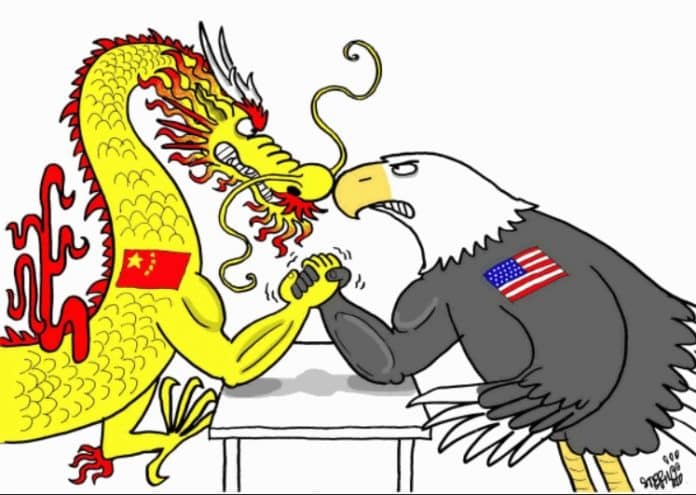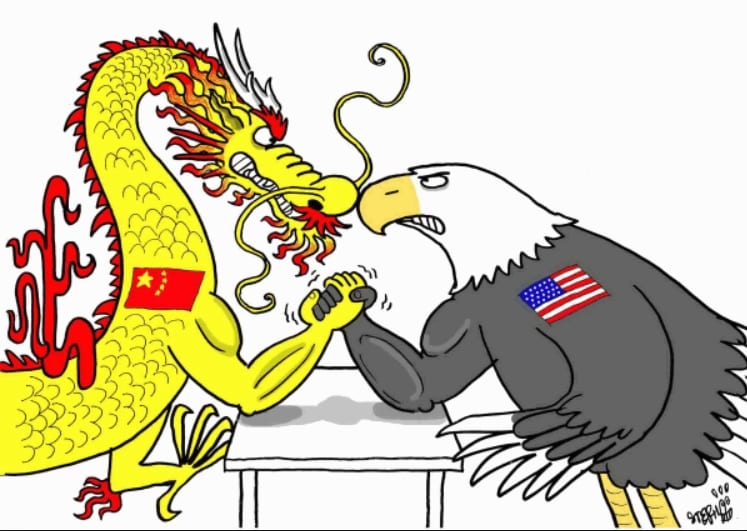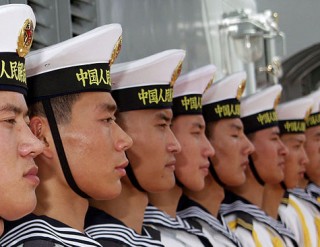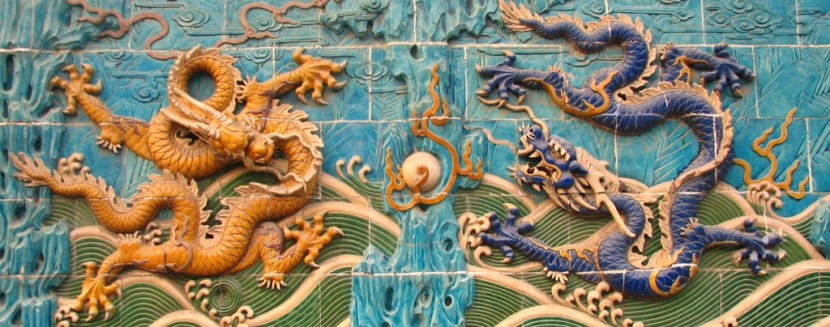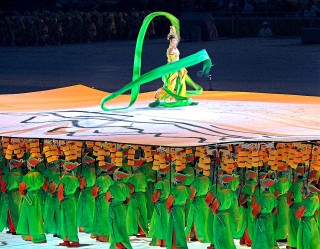… by Reg Little, for VT
___
Most mainstream English language commentary on global developments does little more than grope blindly and uncertainly towards one or two aspects of the elephantine energies transforming the contemporary world. The gentle, cautious, considerate and cooperative movement of the beast seems to demand no more.
VT is playing a unique role in initiating informed examination of many critical international issues where policies and actions often seem misguided and counterproductive. In recent times perhaps the most notable have concerned ISIS in the Middle East and the Kiev Government in Ukraine, although VT’s exploration of the evolution of Western financial culture offers remarkable and critical new insights into the historical background of the contemporary West.
Yet the fundamental character of a global order undergoing rapid and fundamental transformation is mostly neglected. Even amongst its highly qualified and widely experienced contributors, VT offers little insight into the major force driving global change – the remarkable rise of an elephantine and dominant Asian culture, shaped by Chinese thought and history, and the comparative decline of the recently dominant, essentially mono-cultural English speaking maritime powers, the US, the UK and their allies.
This is not a criticism. For understandable, if indefensible, historical reasons, Western nations have literally educated no advisors in official positions with the qualifications, experience and spirit necessary to guide decision makers when interacting with Chinese thought culture. This is despite its role in transforming Asia over the past half century and in now driving even vaster change across the Eurasian continent.
The above assertions are based on over half a century of relevant, if unique, experience in Asia, often observing from close range Western ignorance and ineptness. As an Australian diplomat for twenty five years who received 18 months of Japanese and 15 months of Chinese full-time, in-country language training, it is difficult not to conclude that Western policy only grows in blindness and ineptitude.
One product of the above training and a curious nature led to the use of Japanese experience in the 1960s to project China’s future economic miracle as early as 1976. After spending more than half a diplomatic life working on East Asia, with other experience serving to complement and balance that interest, it became clear that without specialized training and experience even the most gifted native English speakers have great difficulty in relating effectively to developments in East Asia.
Over a subsequent quarter of a century actively engaged in Chinese and Asian exchanges and conferences examining the interaction of culture, economics and politics, this concern has only deepened. This is despite the fact that formal university study of economics in three countries had done its best to discourage and ridicule such interests.
Becoming a Founding Director of the Beijing-based International Confucian Association in 1994 and being elected a Vice President in 2009 offered access to a world that would be beyond the imagination of almost any trained Western economist. The President of this association from 2004 to 2014 is the head of a discreet family that might be said to have played an unrivaled role in both China’s economic revival and its cultural renaissance.
One British historian, John Hobson, has diagnosed the malaise as “intellectual apartheid”. This mentality helped consolidate an English speaking empire, or global order, but now precipitates its decline. This makes it almost impossible for a native English speaker to comprehend that a rival, unrelated cerebral and cultural universe may exist. Even more it is inconceivable that this alternative universe may be more deeply and diversely cultivated than that of the English speakers who have so transformed the past two centuries and defined words like “progress” and “innovation”.
Experience has also made it clear that even advanced diplomatic language training only equips one to begin the journey of discovery. Much emotional engagement, many troubling setbacks, supportive friends and colleagues, a stubborn character and a healthy share of good fortune are all necessary to escape the increasingly crippling handicaps of mono-lingual and mono-cultural English language certainty and other forms of Western self-delusion.
________________________________________
Prisoners of Intellectual Apartheid
With China deftly and reassuringly assuming the strategic leadership of a vibrant Eurasian community likely to be composed of more than 4 billion people the maritime English speaking powers are now in serious danger of being marginalised on the periphery of a transformed global community. Even worse, in a multi-lingual global community, these maritime nations will be trapped in the certainties and regrets of a failing abstract, rational, theoretical and belief based thought culture. Sadly, this English language culture comprehends little of the wisdom of the likely emerging global power centre.
Being Australian, this concern is made more acute by the reality that few Australians have access to the robust integrity of the type of information available on VT. Both mainstream and alternative media in Australia do little more than rehearse the programmed disinformation that characterises mainstream American media.
Moreover, Australia’s history is limited to a military and psychological dependence on a powerful English speaking capital in the northern hemisphere. When London and Washington become confused by and preoccupied with counterproductive initiatives in the Middle East and Eastern Europe, both political leaders and political followers have little encouragement or capacity to reflect on what might be Australia’s own priorities and problems.
Several decades ago there was some rhetoric about Australia making a distinctive contribution to broader Western interests by developing a unique level of expertise concerning its own region. Today, however, almost all news and political comment seems like a hand-me-down from old friends in the northern hemisphere. As a member of the famed five eyes intelligence community, Australia now seems blind, informed only about the imagined and often misjudged anxieties of its old friends.
There is a frightening reality that no English speaker wants to even countenance. This is that China is drawing deeply on a distinctive and, for the English speaker, almost totally inaccessible culture and history. Very few of the West’s so called academic sinologists address this phenomena in any meaningful way. Here “intellectual apartheid” is again a baleful influence as most academics have been educated to pay professional deference to comforting stereotypes that permit no questioning of English speaking certainties and assumed superiorities.
________________________________________
End of Empire Challenges
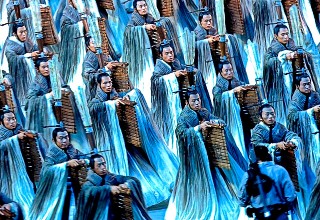
The challenges confronted by President Obama and Prime Minister Abbott at this time as they address a world of fading English speaking certainties are daunting. They are trapped in a world where they are continually guided in the wrong directions.
The Australian Prime Minister reinforces American rhetoric and disinformation about the loss of Australian lives on MH17 and becomes a major contributor of troops to support the United States in the fight against ISIS, a group that seems to be an unfortunate product of American initiative.
When examined closely, both Obama and Abbott seem to be struggling with the best of intentions in the midst of a tangle of conflicting, competing and confusing pressures, none of which they can afford to neglect.
Working within Western democratic structures that do little to prepare politicians for high office and then work continually to distract them with electoral, funding, lobbying and media imperatives, English speaking leaders are severely handicapped from the outset. They cannot even begin to understand the rigorous education, decades of professional preparation, collegial vetting and focused mentoring that prepare Chinese leaders. Moreover, no democratic leader rises to power with an assured tenure for a decade undistracted by the intrusion of electoral processes.
The English speaking world asserts the democratic process as a right desired by all people. Yet the successes of Asian peoples working with or without democratic forms but sharing common traditional values of government cannot but pose some weighty questions about practical aspects of democratic process. These questions can only grow as China becomes an ever more powerful strategic influence and model at the centre of global developments.
The apparent heresy of the preceding sentences immediately highlights several critical issues. The first involves determining whether China’s contemporary practices are a product of ancient traditions adjusted for the 21st Century or are a predictable result of a revolution based on the ideals of a relatively recent Western ideology – Communism. Experience of Capitalist Japan in the 1960s can lead one to argue that all East Asian governments are best understood as modern variations of ancient traditions of Confucian, Legalist and other distinctive values.
The second critical issue, which is even more heretical, is whether most Western democracies are proving themselves uncompetitive and dysfunctional in a global community where the Chinese economy is becoming dominant and trend setting. The third issue, again more heretical, is whether the contemporary bankruptcy of most Western economies, is not an inevitable outcome where the power of democratic institutions is effectively overshadowed by the might of finance, often exercised through ubiquitous privately owned central banks capable of uncontrolled money creation and debasement.
The above paragraphs touch on some complex and weighty questions, which cannot be explored further here. They highlight, however, the way in which China’s peaceful rise is beginning to pose awkward questions that are alien to Western thought and consciousness.
________________________________________
Chinese Culture and History
This might lead to the recognition of a need for a quick exploration of the unique thought culture that informs China’s, and Asia’s, peaceful rise. This culture remains a closed book to the West but, at least on the basis of my experience, enables one to anticipate with some confidence the likely course of Chinese led global developments over the rest of this century and beyond.
For Westerners nurtured on Abrahamic beliefs, there are many challenging dimensions to this thought culture and it will only be possible here to touch on half a dozen and then to comment briefly on the role of a long, continuously recorded history in establishing and refining their authority and wisdom.
First, there is Confucianism, which builds a powerful social and political ethos on the affections and ever changing relationships of the family. These make nonsense of the West’s fashionable “universal values”, with their glorification of characteristics like equality, freedom and individualism, which are dysfunctional in a family environment.
Second, there is Daoism, which poses riddle after riddle in dispensing of almost all certainties and reassurances in human life, even as it introduces a depth of sensitivity about the challenges confronting organic life that is nourishing, inspiring and resilience building.
Third, there is the Book of Changes, which presents as a book of divination, but that in reality is designed to invite reflection on the challenges and central values and imperatives of human existence. Moreover, it was designed several millennia ago around a type of mathematical, probabilistic formulation that 20th Century scientists have shown mirrors the structure used to explain the DNA of living creatures.
Fourth, there is Legalism, seen both as a rival and complement to Confucianism. It is concerned with practical and formal issues, focusing on the administrative imperatives of large government. While often denigrated from a Confucian perspective, the discreet practice of legalism’s strict authority has been an underlying source of political strength in Confucian societies.
Fifth, there are reputedly over a thousand strategic classics, which explore deeply the practical essentials in winning, holding and expanding political power, mostly reinforcing value systems inherent in the influences outlined above. These emphasise needs like studying and understanding both oneself and one’s adversaries and winning victory by soft strategies that minimize destruction.
Sixth, there is a voluminous library of heath classics that have been marginalized, if not discredited, by the West’s aggressive corporate health cultures. The growing recognition of problems inherent in Western processed food, synthetic drugs and invasive surgery has already led to a powerful alternative health culture that has begun to identify the values of Chinese foods, herbs, therapies and soft exercises.
All of the above cultural dimensions are founded in classics that date back more than two millennia and that have been tested, proven and refined over a long, eventful and continuously recorded subsequent history. No other contemporary power even begins to rival this ready use of ancient classical language and wisdom in contemporary practice or this achievement of continuous and ever enriching history in the face of the most daunting challenges.
________________________________________
The Contemporary World
Xi and Putin military reviewFrom the above perspectives, it can appear that the United States and its English language allies have already surrendered any lingering global leadership credibility. The disastrous engagement in a series of small, unwinnable wars has invariably reflected a failure to study and understand both self and adversary. Moreover, the use of soft strategies has been left to adversaries and the emphasis on hard strategy has proven wasteful, alienating and ineffective.
This has allowed China to discreetly assume leadership in economic productivity, embedded technology, financial viability, educational excellence, political authority and alliance building.
The misadventures of the English speaking world, based on anachronistic habits from past imperial days, have allowed China to assist its allies in formulating new international structures that are sidelining the post 1945 international system with its various privileges for the Anglo American powers.
With Russia driven into a close alliance with China through American ineptness and over-reach in Ukraine, it has become implausible to assume that American defence technology, with its dependence on corporations with a single minded preoccupation with profit, has any significant areas of practical, strategic advantage. Indeed, the F 35 fighter has become a symbol of the perils of dependence on the reputed superiority of American military technology.
There is much implicit evidence that this is recognised by responsible leaders in the Pentagon, even as it remains politically impossible to address such realities publicly.
________________________________________
A Way Forward
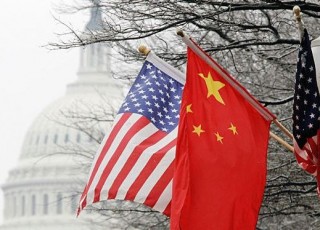 The foregoing is not written by an advocate of surrender, only by an advocate of the need for practical, informed and, as far as possible, mutually beneficial policy. Already for some time a number of financial commentators have suggested that both China and Russia have the capacity to collapse the value of the American dollar and in the process to greatly reduce American power and influence.
The foregoing is not written by an advocate of surrender, only by an advocate of the need for practical, informed and, as far as possible, mutually beneficial policy. Already for some time a number of financial commentators have suggested that both China and Russia have the capacity to collapse the value of the American dollar and in the process to greatly reduce American power and influence.
It has been my view that China does not want to rush either its own rise or America’s decline and would like to preserve as much and as long as practical present global activities and structures. Russia is not as strongly placed as China and has been much more aggressively provoked in Ukraine. Yet it also has refrained from using this financial strategy to rein in perceived American provocation.
Both China and Russia are likely to have detailed understanding of the contending political rivalries in Washington and seem inclined to allow these to work themselves out and in the process further reduce American capacity for effective strategic action. Moreover, despite much exaggerated rhetoric, neither Beijing nor Moscow seem intent on some form of military conquest. This allows some time for Washington and its allies to explore and develop more useful and better informed strategies for the future.
In this context, it is probably critical to recognise how much the rise of the West and the English speaking world has been the product of the genius of a small community that has mastered the West’s financial and central banking systems and used these to structure today’s global order. They have only failed in matching wits with the East Asian peoples of Confucian tradition.
Shown the way by Japan, these have over a little more than half a century used an ancient strategic wisdom of “conquest through service” to effectively bankrupt the West and its central bankers. It seems important to understand that in critical respects this discreet and small financial community has been separate from and, in a manner, overseeing and guiding the democratic electorate in most Western societies.
One possibly reassuring factor for the future is that in an emerging China centric global order all but the people of East and, to a lesser degree, South East Asia will need to start from the beginning in mastering a most unfamiliar and demanding Chinese thought culture. Here the major obstacles limiting the prospects of the English speaking peoples derive from the qualities of complacency, arrogance and certainty that invariably handicap people who have inherited imperial privilege at a time of decline.
It is of interest that the Chinese have recorded in great detail the predicaments and confusions associated with these End of Empire experiences, at least six times over the past two thousand hears as dynasties have declined.
A Chinese television series capturing the behavior of Manchu aristocrats in the 19th Century can invite immediate comparison with contemporary Wall Street financiers. Both display an absence of any capacity to escape the smothering privileges of their positions and address in a meaningful way the strategic demands of their rapidly disintegrating power base.
It remains to be seen who in the West best addresses the challenge of the Chinese thought culture that is remaking the 21st Century. Will it be the powerful and astute financiers, who have crafted the West’s remarkable and transformative progress, that escape the constraints of their privileges and reinvent themselves? Or will some distinguished group emerge from the West’s disintegrating democratic societies to absorb new wisdom from the East and show the way forward, with reinvented and revitalized political, financial and corporate cultures?
Whatever the case, it is now beyond question that the elephantine energies of Chinese civilization are transforming the global community. This is happening in many ways that remain poorly perceived by those blinded by the privileges and certainties recently associated with English language and culture. Future prosperity will require clear sight, serious study and mature understanding in approaching this unique and ancient civilization of the Chinese people.
 Reg Little was an Australian diplomat for 25 years, working in Japan, Laos, Bangladesh, the United Nations (New York), Ireland, Hong Kong, China, Switzerland, and the Caribbean. He was Deputy or Head of Mission in five overseas posts and served in Canberra as Director of North Asia, International Economic Organizations and Policy Planning as well as Executive Director of the Australia-China Council. He obtained high level language qualifications in Japanese and Chinese.
Reg Little was an Australian diplomat for 25 years, working in Japan, Laos, Bangladesh, the United Nations (New York), Ireland, Hong Kong, China, Switzerland, and the Caribbean. He was Deputy or Head of Mission in five overseas posts and served in Canberra as Director of North Asia, International Economic Organizations and Policy Planning as well as Executive Director of the Australia-China Council. He obtained high level language qualifications in Japanese and Chinese.
He has participated regularly since 1987 in Conferences in Asia, particularly China, that have addressed Asian traditional civilization and economic development. He has been a Director of the Beijing based International Confucian Association since its foundation in 1994 and was elected its then only Vice President not of Asian ethnicity in 2009.
He has co-authored two books – The Confucian Renaissance (1989, published several times in both Japanese and Chinese) and The Tyranny of Fortune: Australia’s Asian Destiny (1997). His most recent publications as sole author are A Confucian-Daoist Milennium? (2006) and a Smashwords Ebook Chinese Mindwork: A Primer on Why China is Number 1 (2015). More of his writings can be found at www.confucianconsensus.org. He can be contacted at cmindwork@gmail.com
ATTENTION READERS
We See The World From All Sides and Want YOU To Be Fully InformedIn fact, intentional disinformation is a disgraceful scourge in media today. So to assuage any possible errant incorrect information posted herein, we strongly encourage you to seek corroboration from other non-VT sources before forming an educated opinion.
About VT - Policies & Disclosures - Comment Policy

